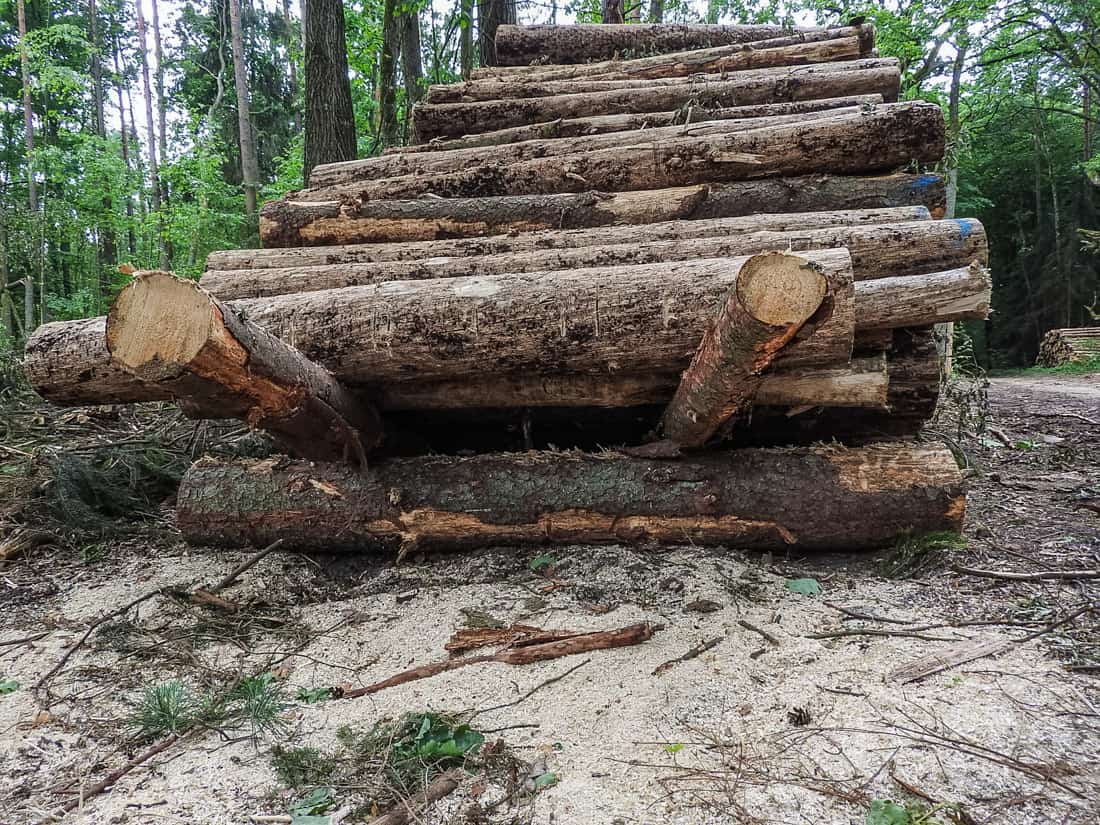Drax’s “insatiable” demand for wood is harming Baltic forests, campaigners have claimed following the publication of a damning report.
Compiled by NGOs in Estonia and Latvia, the report reveals that together the two countries exported more than three million tonnes of wood pellets last year – equivalent to at least 200 square kilometres of clearcut forest.
The authors argue that the intensification of logging is reinforced by biomass demand from foreign bioenergy companies such as Orsted, RWE and Drax.
Kelsey Perlman, a climate campaigner for forests NGO Fern, said the report exposed “a glaring paradox at the heart of the EU’s environmental policies”.
“This report reveals the intolerable pressure facing some of the most valuable habitats in Estonia and Latvia,” she told DeSmog.
Like what you’re reading? Become a DeSmog patron today!
“The EU’s Renewable Energy Directive, which allows Member States to subsidise burning woody biomass under the banner of ‘green energy’, has a clear role in the destruction of forests and wildlife, which are meant to be protected under the EU’s Natura 2000 policy.”
Almuth Ernsting, a campaigner from NGO Biofuelwatch, said the report showed how forests in the Baltic States are being “harmed by Drax’s insatiable demand for wood”.
“Stopping and redirecting subsidies for burning wood in power stations will help protect forests in each of those regions,” he added.
‘Absurd’
The report reveals that intensive logging, which includes an increasing share of logging for wood pellets, has led to Latvian forests releasing more carbon than they absorb and store.
An Estonian Government report demonstrates that under the current policy, the country’s Land Use, Land-Use Change and Forestry Sector (LULUCF) would turn into a net source of greenhouse gas emissions by 2034 and that the current forest carbon sink would decrease by almost 50 percent over the next five years.
Estonia and Latvia are vital exporters of wood biomass for energy to European countries such as Denmark, the Netherlands and the UK. They are heavily forested and in 2016-18, recorded 85 percent more logging than between 2004 and 2015. Clearcutting, extracting every tree from an area, is the main industry procedure for removing wood.
Dr. Viesturs Kerus from the Latvian Ornithological Society, which analysed data for the report, said: “The absurd idea that more intensive logging of forests and burning wood is somehow good for the climate is still widely promoted in Latvia.”
“The hard numbers show the opposite: the increasing logging intensity in Latvia and Estonia is not only reducing the ability of forests to absorb carbon, but also destroying precious habitats and threatening forest-dwelling species.”
Biodiversity
This increase in logging intensity has serious consequences for biodiversity in both countries. Over the past decade, 14 percent of Estonia’s old-growth forests have been degraded to the point that they can no longer be considered old-growth. The number of breeding forest birds is also decreasing by 50,000 pairs each year and habitat destruction by logging is a key contributing factor.
Devastating logging, including clearcuts, is also taking place in Natura 2000 network forests, the pan-European conservation network upheld by EU directives. In the past five years, many logging restrictions that previously protected Estonia’s Natura 2000 sites have been eased, meaning clearcuts are now allowed.
The report comes just a week after 75 organisations, including environmental and public health bodies, trade unions and community groups, sent an open letter to the UK government, calling for renewable electricity subsidies to be redirected away from biomass to the cleanest and lowest carbon renewable options such as wind and solar power.
The letter demands the redirection of over £1 billion annual biomass power subsidies as part of the Cut Carbon Not Forest campaign by UK and US NGOs.
Drax previously claimed that 12 percent of UK renewable energy is delivered by its biomass plants. Research by Biofuelwatch suggests that Drax power plants in the UK are operating on somewhere near £1 billion in subsidies.
In April 2019, campaigners petitioned against Drax’s plans to convert the existing coal electricity generation units to gas generation and battery storage at its biomass and coal plant in Yorkshire and asked for further public subsidies to undertake the development.
Drax did not respond to a request for comment.
Main image credit: European Wilderness Society
Subscribe to our newsletter
Stay up to date with DeSmog news and alerts







